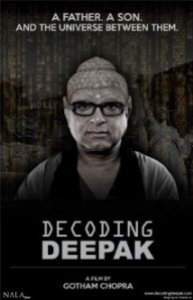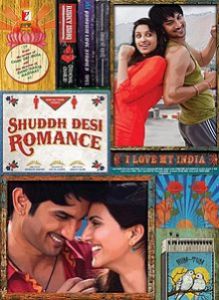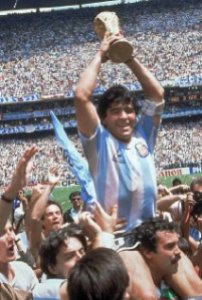Decoding Deepak (2012)
Deepak Chopra has made a fortune as a spiritual advisor to the rich and famous. This film directed by his son, Gotham Chopra, follows Deepak as he goes through Blackberry withdrawal while visiting monks in India, obsesses over his next book, meets with the powerful in corporate boardrooms, and works on a spiritual video game.
In a rare moment of personal reflection, Deepak admits he loves his grandchildren more than his children, whom he seems to regard as a distraction from his work.
It’s an interesting insight into the life of an influential man, but feels like a vanity project and an attempt to humanize Chopra and expand his brand.
From Harlem with Love (2014)
A part of ESPN’s 30 for 30 Shorts, this details a 1959 exhibition game in Moscow involving the Harlem Globetrotters during the height of the Cold War.
It suggests the Globetrotters were able to win over several of the Russians they encountered with their antics and argues the game played a role in thawing American / Russian relations during the period.
It’s an interesting footnote, but not much else.
Shuddh Desi Romance (2013)
On the way to his wedding, Raghu Ram meets Gayatri on a bus and falls in love, leaving Tara at the altar, but when the new couple decides to marry, Gayatri leaves Raghu at the altar.
Despondent, Ragu runs into his old fiancée Tara who invites him on a date and they fall in love. He is going to propose to her a second time, but once again runs into Gayatri.
After a period of indecision, the film ends with Raghu and Gayatri realizing they love each other, but should never marry, opting for cohabitation instead.
Watching Bollywood films, it feels like they’re lagging about thirty years behind, fighting cultural battles long ago settled in the Western world, but while Western films responded to these battles with the one-two punch of cynicism and irony, Indian films seem to be responding by doubling down on earnestness.
Maradona ’86 (2014)
A part of ESPN’s 30 for 30: Soccer Stories, this short documentary chronicles the career of Argentinian Diego Maradona in the 1986 World Cup.
I’m not a huge fan of soccer, but I enjoyed this series of short films. It’s difficult for non fans of any sport to understand its rivalries and traditions, but films like this provide an entry point for greater appreciation of the sport.
The Opposition (2014)
This is another entry in ESPN’s 30 for 30: Soccer Stories.
In 1973, Augusto Pinochet strong armed his way to power in Chile. Many members of the Chilean national soccer team were supporters of his predecessor, Salvador Allende, who died in mysterious circumstances during the coup. Allende’s supporters alleged he was assassinated, while Pinochet’s supporters claimed he committed suicide.
Many in the capital of Santiago openly rebelled against the Pinochet led junta. The government imprisoned and killed many of these dissidents, temporarily turning Santiago’s National Stadium into a prison camp.
The Soviet Union backed the Marxist Allende and were outraged at his ouster. Scheduled to play Chile in a World Cup qualifying match a few months later, the team refused to participate as a protest. Chile won the forfeited match and qualified for the 1974 World Cup.
Major sports in the United States are provincial affairs: city versus city or region versus region. Soccer, however, has a unique history as an international sport, often pitting country versus country. Because of this, international politics often play a role in the sport which leads to fascinating instances such as this.
The Education of Mohammad Hussein (2013)
This short documentary chronicles the life of Muslims in America after September 11, 2001, focusing on the inflammatory rhetoric of Christian fundamentalist Terry Jones, and his efforts to delegitimize the right of Muslims to live in the United States.
By showing us the film through the eyes of children who attend an Islamic school in a Detroit suburb, this film forces us to see how divided America really is.
The Great Race (1965)
When Professor Fate (Jack Lemmon) keeps sabotaging his stunts, The Great Leslie (Tony Curtis) challenges Fate to a race in newfangled automobiles from New York to Paris. Soon, others enter the competition, including journalist and suffragette Maggie Dubois (Natalie Wood).
Rounding out the cast are the always great Peter Falk as Fate’s henchman Maximillian Meanie, and Vivian Vance (best known as Ethel Mertz) as Hester Goodbody, the wife of a newspaper publisher.
Breakfast at Tiffany’s (1961), S.O.B. (1981), Victor Victoria (1982), and The Pink Panther series are comic masterpieces, but this film from Blake Edwards feels more like a film school assignment than a fully realized film. He crammed too many gags and homages into the movie, and Dubois is a distracting feminist undercurrent which feels tacked on and patronizing.
Curtis and Lemon combined to give us one of the best comedies ever filmed, but this is not Some Like it Hot (1959).
The film’s highlight is the pie fight. A logistical and choreographic triumph, this amazing five-minute sequence took days to shoot and costs thousands of dollars, but sadly it’s surrounded by a forgettable film with a few clever gags. I’ll save you the trouble of watching the rest of the film.






